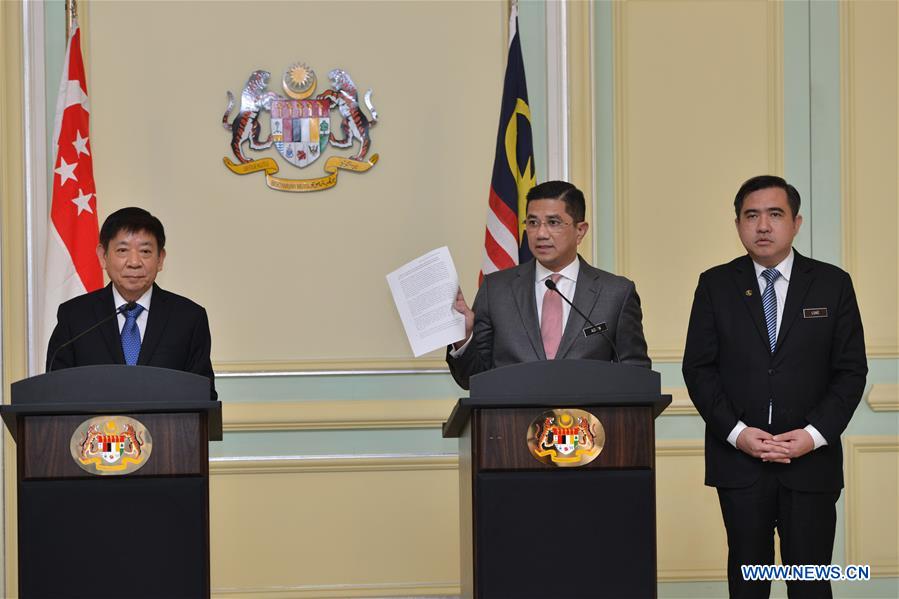
Malaysia's Economic Affairs Minister Mohamed Azmin Ali (C) and Khaw Boon Wan (L), Singaporean coordinating minister for infrastructure and minister for transport, attend a joint press conference in Putrajaya, Malaysia, Sept. 5, 2018. The government of Malaysia and Singapore signed an agreement on Wednesday to defer the construction of the high speed rail (HSR) project linking the two countries by two years till 2020. (Xinhua/Chong Voon Chung)
KUALA LUMPUR, Sept. 5 (Xinhua) -- The government of Malaysia and Singapore signed an agreement on Wednesday to defer the construction of the high speed rail (HSR) project linking the two countries by two years till 2020.
At Malaysia's request and in the spirit of bilateral cooperation, Singapore has agreed to suspend the construction of the HSR project for a period up to May 31, 2020, according to the joint statement issued by the two countries.
The agreement was the result of weeks of "intense negotiations," said Malaysia's Economic Affairs Minister Mohamed Azmin Ali, adding that "we have come to an agreement and we met all the concerns from Singapore and Malaysia."
Azmin signed and exchanged the legal documents on the deferment with Khaw Boon Wan, Singaporean coordinating minister for infrastructure and minister for transport in Malaysia's administration center of Putrajaya, witnessed by Malaysian Prime Minister Mahathir Mohamad and visiting Singaporean Deputy Prime Minister Teo Chee Hean.
"Many Singaporeans have been looking forward to the realization of this project, and we remain committed to this project," Khaw told a joint press conference with Azmin after the signing ceremony.
"But we understand why Malaysia needs to temporarily suspend the construction of the HSR project," he said. "So even though the HSR bilateral agreement has no provisions for such a project suspension, but in the spirit of bilateral cooperation, Singapore has given Malaysia's request serious consideration," he added.
The deferment period till May 2020 is a negotiated figure between the two sides, said Khaw.
"From Singapore's point of view, there is a limit as to how far we can postpone the project," said Khaw, citing uncertainty in cost projection. "We think this is sort of a suspension period which we can try to manage," he said.
The governments of Malaysia and Singapore signed a legally-binding pact on the project in 2016 to build a high speed rail linking Malaysia's capital of Kuala Lumpur to the city state, which would cut travel time to 90 minutes once in operation.
However, Malaysian Prime Minister Mahathir announced shortly after taking office in May that the high speed rail would be dropped, citing high cost and low usage. He later changed tone that his country would seek deferment on the project, saying it has to pay a penalty of around 500 million ringgit (123.1 million U.S. dollars) to Singapore for the cancellation.
According to the agreement, Malaysia will bear the agreed cost in suspending the HSR project, despite earlier media report that Malaysia would not need to compensate Singapore.
"As suspension will involve some abortive costs, Malaysia will reimburse Singapore for the abortive costs," said Khaw.
If the project is not resumed after the suspension period, Malaysia will reimburse the cost incurred by Singapore in fulfilling the HSR project, he added.
Azmin said both parties agreed that the abortive costs that need to be paid by Malaysia government amounted to 15 million Singapore dollars (10.88 million U.S. dollars) and need to be paid before end of January 2019.
Although the agreed postponed period is two years, the commencement date of HSR service is expected to be pushed back to Jan. 1, 2031, instead of the original plan of Dec. 31, 2026.
Given the length of the suspension period, both sides will be calling off the ongoing international joint tender for the HSR Asset Company, which would be responsible for designing, building, financing, operating and maintaining all assets for the HSR project, according to the joint statement.











